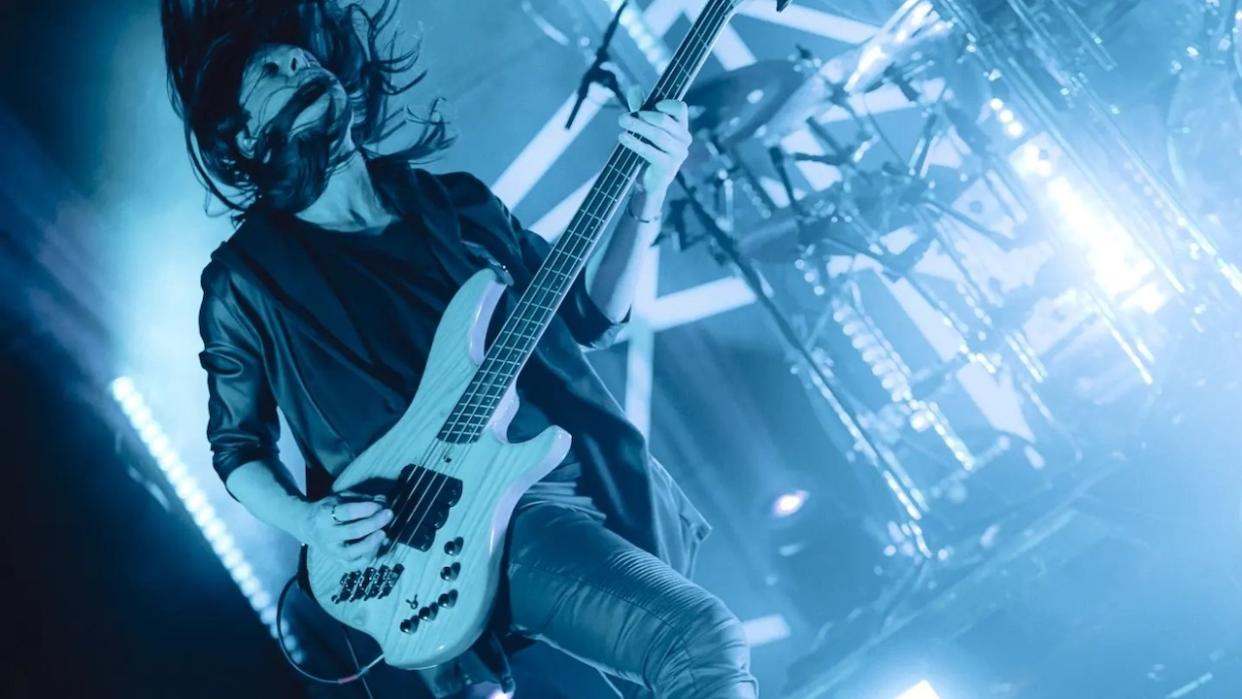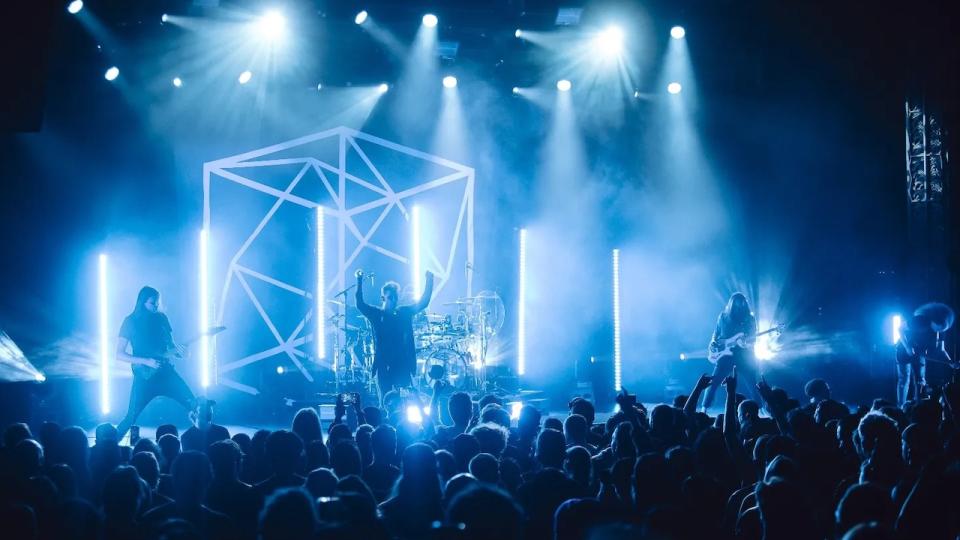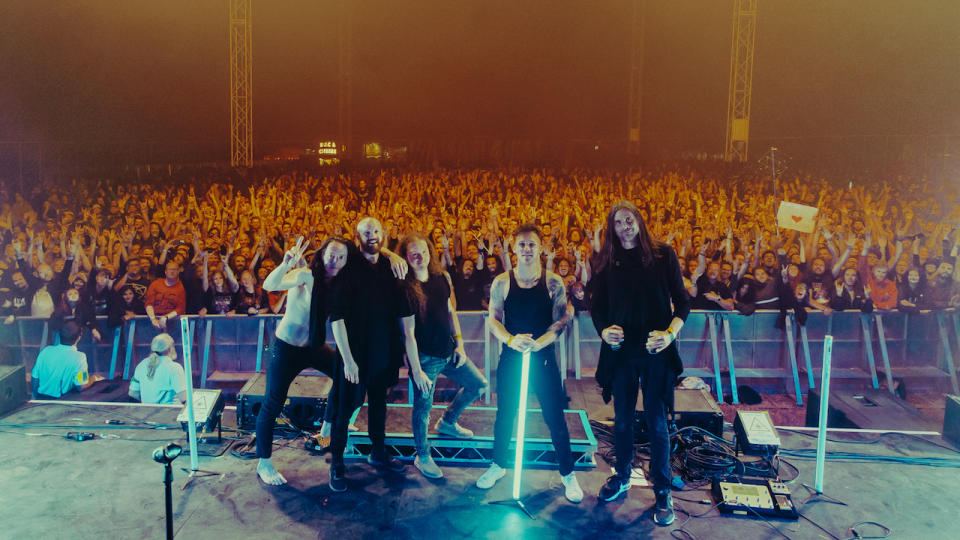“Fingers or pick? I’ll play bass with a drumstick! Whatever works for the song!“ How Amos Williams found his sound on TesseracT’s War of Being

- Oops!Something went wrong.Please try again later.
It’s been a decade and more since progressive metal band TesseracT broke into the big time, touring with bands like Animals as Leaders and Karnivool on the back of huge-sounding albums such as One (2011), Altered State (2013), Polaris (2015), and Sonder (2018).
Based on mighty riffs from guitarist Acle Kahney and the bass guitar manoeuvres of Amos Williams, TesseracT remain among the hardest-hitting prog metal bands around, especially on their new record, War of Being. The album is of particular interest to bass players – because the low-end is all over it.
Asked how he feels about the new release, Williams explains: “It’s dynamic, dramatic, full of details and textures, and it’s ambitious. It’s also more chaotic and collaborative than ever. It’s been a massive journey that’s brought the best out in all of us.”
When it was unveiled, the band also announced a seven-month world tour and released the 11-minute-long title track as a single.
We caught up with Williams during the North American leg of the tour to talk bass tones, picking style, and the future of heavy guitar music.
How do you feel about the new album?
“Making the album has been a journey that’s covered so many different disciplines. I am very happy with my contribution, but I'm also in a period of grief now that a part of it has come to an end. I think we all enjoy the creative process so much, that it's a strange place to be in once it is over.”
It sounds as though you enjoy recording?
“I love it, and I hate it! It's wonderful to arrive at the end result, but getting there can be frustrating. Some songs just happen, but others can take forever. In that sense, War of Being represents the sum of our output over the years.”
How would you describe your the role within the band?
“My role is one of adding power to the guitar lines, but also just a touch of funk. Percussive dead-notes and left-hand silliness seem to be essential in TesseracT! I used to always overplay, which led to some really fun bass parts that solidified TesseracT as a bass-driven band. As the years have gone on, I've felt a desire to lift everyone up to that same point. Now, I feel that we’re all at the front of the track doing our thing as a unit, rather than as a collection of individuals.”
What’s your favourite bassline from the new album?
“That changes all the time. I love the bass-focussed riffs like Burden. Sacrifice has some fantastic slap sections that are full of attitude, but I’m also really stoked with some of the more intricate parts where myself and Acle play in complete unison. Songs like The Grey. The second verse of the track Echoes, which is an homage to Nine Inch Nails, is another fun part to play. The bass just plays an intense sixteenth note part, but it's got so much life and attitude to it.”
How did you come up with your bass parts?
“A lot of TesseracT is Acle. He writes the most intricate and creative parts, but he also gives some of the most exciting parts to me. Like the multi-string slap part on Burden, where I'm not necessarily sitting in the traditional bass role. I might build a part that could easily be a multi-instrument sample, or other times I’m playing the role of the drums, but through the voice of the bass.”
Fingers or pick?
“I'll play bass with a drumstick! Whatever works for the song! I’ve recently found myself taking a guitar part and wanting to get the bassline as close to it as possible, which has led me to develop my picking style more. Especially with this album, as we needed a lot of precision with some of the more djenty stuff. So, it's almost like I'm learning to play bass again, which can only be a good thing.”

What's your favourite setup when you record?
“I actually discovered something new for this record, which is a Sadowsky DI preamp. I bypassed the onboard preamp on my basses, which isn’t something that necessarily works well onstage, but it was great for the studio. Then we threw the signal into an old Manley ELOP+ Compressor. I understand that a Universal Audio LA2A covers a similar function, but this setup has more edge, which I really need against the wall of sound that is TesseracT.”
Do you ever feel pressured to go with a particular setup?
“I've never felt like I need to use anything in particular. I have a sound in my head that I'm always chasing, but whatever the setup, after a few days I usually end up sounding like me.”
How did you decide what bass to use?
“I tried a bunch of basses on this album, but we ended up using three. First was an Ibanez LACS BTB 4-string with a piezo pickup and a Nordstrand Bigman. I also played an old Warwick FNA Jazzman, which has appeared on every TesseracT record in some form. That bass can sound a bit ‘muddy’, but it has something very cool in the highs that’s super expressive. I actually rewired the PCB on the preamp while on tour, so I think I found a cool thing by accident! For the really heavy sections we needed to eschew some of that mud and dial in some solid clarity, for which I used a Dingwall NG. Man, that thing sounds heavy!”
How do you keep bass notes from getting lost in the mix?
“Acle has always used a technique called parallel distortion, which involves splitting the signal, and then high-passing anywhere between 400 - 600Hz. We then low-pass between 5kHz - 2kHz, and use a plugin, like a FabFilter Saturn, which is a Swiss Army knife of overdrive.”
How do you feel about the ‘fix it in the mix’ approach?
“If it's wrong going in then it will always destabilise your creativity, which means you will spend more time fixing than mixing! You’ll end up focussed on the technicality rather than the emotion of a track, which defeats the point.”
How much does the mastering process affect your bass tone?
“It depends on the workflow. If you’re mixing and then mastering, I would argue that any decisions you make are technical rather than creative. However, if you mix into your mastering 'block' then you can react to how the mastering tools impact upon the bass, which allows you the freedom to make creative choices right up until the final render.”
What amp set-up are you using at the moment?
“TesseracT stopped using amps a long time ago. I was using a Mesa Boogie Big Block 750 with a 4x10 and a 1x15 cab, which was ferocious and often larger than any venue PA. At the time, I had started to position it in the wings to give the band more clarity onstage, which led the guitarists to do the same. Then we started questioning why we needed cabinets at all.”
What’s your signal path live?
“We were early adopters of things like the Line 6 Pod, and Kemper Amps, and now the Neural DSP Quad Cortex. For a band that travels the world these things are awesome. On this tour my signal path is a Dingwall Combustion 4-string into the Quad Cortex and then out to the front of house. I’m using a fairly simple setup with the Quad Cortex, running a noise gate, gain, EQ/Compression, parallel overdrive, amp head/cab sim, tone curve EQ/limiter and noise gate. I might throw in some modulation, but there's so much happening in a TesseracT mix that it would only be for the benefit of my monitor mix.”
In what direction do you see heavy guitar music heading?
“I guess technology will be the overriding agent of change. Modern recording techniques gave rise to the wave of djent, and the nature of the Internet allowed these very technical musicians to share influences, meet and form bands. A generation later, and it’s now the norm that we have bands like Polyphia and Unprocessed, who are finding new ways to make noise. I can't imagine what the next advancement in instrument technology will be, but it will surely have a massive impact and shape what we output.”

How do you keep up with the changes?
“I guess as all bassists should do. I keep my ears clear, and my mind open.”
What should a good bassist do for a band?
“Good and bad are subjective from a very real standpoint. Maybe the style of the music lends itself to being an objectively terrible musician? But if what you are doing supports the art and intent of the music, then you are surely doing the best thing for that band.”
War of Being is out now via Kscope. See TesseractBand.com for tour dates.

